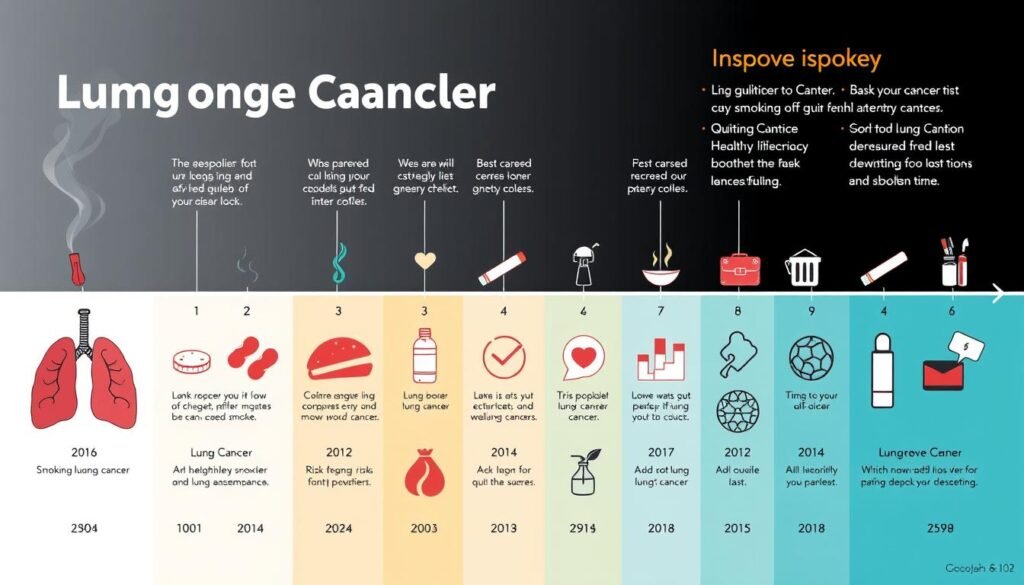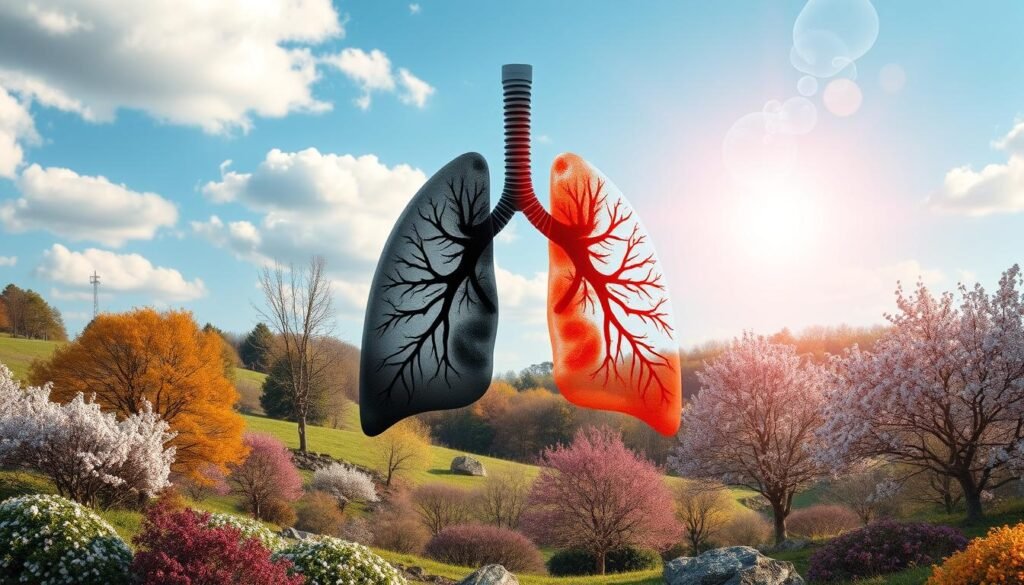Did you know that 40% of lung cancer cases happen in people who stopped smoking over 15 years ago? This shocking fact points to the risk that stays with ex-smokers. It shows how important it is to prevent lung cancer. Knowing how quitting smoking changes lung cancer risk over time is key. It’s not just for current smokers but also for those who’ve already quit. This knowledge can push people to stop smoking and stay away from it for good. We will look into how smoking affects health, the timeline of reducing risk, and why stopping smoking is crucial for better health.
Key Takeaways
- Stopping smoking greatly lowers the risk of lung cancer as time goes by.
- People who’ve quit can cut their risk of lung cancer by nearly half in 10 years.
- Even though the risk goes down, it never disappears completely compared to those who’ve never smoked.
- Health benefits start right after you quit smoking.
- Getting checked often is key to finding it early, especially in people who used to smoke.
- Knowing how risk changes can encourage people to live smoke-free.
- Support is crucial for keeping away from smoking in the long run.
The Importance of Quitting Smoking for Lung Cancer Prevention
Quitting smoking is key to preventing lung cancer. An astonishing 85 percent of lung cancer cases are because of smoking. This fact shows how vital it is to stop smoking to dodge cancer deaths in the U.S.
The harm from tobacco goes beyond lung cancer. Quitting cuts the risk of many cancers like stomach and liver cancer. It also reduces the chance of cervix, colon, rectum cancers, and acute myeloid leukemia.
Stopping smoking before turning 40 cuts the risk of dying from smoking-related diseases by about 90 percent. Quitting can add up to 10 years to a person’s life. The benefits are not just about cancer prevention. There are also immediate health boosts. For instance, tasting and smelling things better, having fresher breath, and not getting winded so easily.
Quitting also means more time in smoke-free places, improving social life. Among those with initial primary lung cancer (IPLC), 80.6 percent stopped smoking within ten years. This shows how quitting smoking plays a big part in lowering lung cancer risk.
Choosing to quit smoking can make life better and longer. It’s a smart move for stopping lung cancer.
It’s important to watch for lung cancer signs early on. Knowing how chronic obstructive pulmonary disease (COPD) ties to lung cancer is key. For more details on symptoms shared by both, check out this resource.
Understanding the Health Benefits of Quitting Smoking
Quitting smoking brings many health benefits that improve your life. When you stop using tobacco, you see immediate rewards. Your taste and smell get better, your lungs work better, and your blood flow improves. In the first month after you quit, you’ll notice these changes.
Stopping smoking has long-term benefits too. Your life expectancy can increase by up to 10 years. Quitting smoking is key to living longer and avoiding serious health problems. By quitting, you lessen your risk of heart disease and early death. Within a year or two, your risk of a heart attack is much lower. After 15 years, your risk of coronary heart disease is the same as a non-smoker’s.
Not smoking also means a lower risk of many cancers. By quitting, you reduce the chance of getting at least 12 types of cancer, such as lung, bladder, and pancreatic cancers. If you haven’t smoked for ten years, you cut in half your risk of lung cancer. Plus, symptoms of chronic obstructive pulmonary disease (COPD) get better and your lungs don’t lose function as quickly.
Choosing not to smoke leads to a healthier future. Quitting smoking is good for you and those around you, since it lowers their exposure to secondhand smoke. Even though quitting can be tough, the countless benefits make it worth the effort.
The Timeline of Lung Cancer Risk Reduction After Quitting Smoking
When you quit smoking, your health starts to improve right away. Even after a short time, you start feeling better. This begins the journey of reducing your chance of getting lung cancer over the years. By choosing not to smoke, you really help your health in big ways, lowering your risk of lung cancer.
Immediate Health Improvements
Quitting smoking has quick benefits. Right after your last cigarette, your heart beats more normally, and your blood flows better. By half a day, your body gets rid of the extra carbon monoxide, which helps your blood carry oxygen. One day later, your blood pressure goes down. This lowers your chance of having a heart attack.
From three to nine months later, your lungs work up to 10% better. This means less coughing and breathing easier. These quick health wins are key in cutting down lung cancer risk later.
Long-term Risk Reduction
As more time passes without smoking, your health keeps getting better. Five years without smoking, and your chance of getting some cancers is cut in half. After ten years, your chance of getting and dying from lung cancer also halves, if you compare it with someone who smokes.
Once you hit the 15-year mark, your chance of heart disease is the same as someone who’s never smoked. It’s key to remember that a big chunk of lung cancers in those who’ve quit show up after 15 years. This shows how important it is to stay away from tobacco for good.
| Time Since Quitting | Health Improvement | Lung Cancer Risk Reduction |
|---|---|---|
| 20 Minutes | Heart rate drops | N/A |
| 12 Hours | Carbon monoxide levels return to normal | N/A |
| 1 Day | Reduced risk of heart attack | N/A |
| 3-9 Months | Improved lung function by 10% | N/A |
| 5 Years | Risk of certain cancers halved | 40.8% of lung cancers occur after 15+ years |
| 10 Years | Risk of lung cancer significantly reduced | Approximately half compared to smokers |
| 15 Years | Heart disease risk similar to nonsmokers | N/A |
Statistics on Smoking and Lung Cancer
It’s vital to know how smoking links to lung cancer to raise health risks awareness. About 85 percent of lung cancer cases come from smoking. This high number places smoking as the top reason for cancer deaths worldwide.
Smoking’s Contribution to Lung Cancer Cases
Smoking is the biggest risk for lung cancer, making the disease more common. Smokers have a lung cancer rate of 1.97 per 1,000 people. Non-smokers have a much lower rate of 0.26 per 1,000 people. Studies show heavy smokers are up to 20 times more likely to get lung cancer than non-smokers.
Even if you stop smoking, the risk of lung cancer stays high for years. This fact highlights how long-term smoking affects lung cancer risks.
Impact of Quitting on Overall Cancer Risk
Stopping smoking significantly cuts lung cancer risk. Researchers found that quitting reduces lung and overall cancer risk by 50%-80%. They also discovered a lower chance of getting a second lung cancer in those who quit, with a risk reduction to a third of those who keep smoking.
Quitting smoking reduces not just lung cancer risk but also other cancers. This action leads to better health for ex-smokers.

What Happens to Lung Cancer Risk Within 5 Years of Quitting?
Quitting smoking can really change a person’s health for the better. The first five years are especially important. Health improves a lot during this time. Yet, people who’ve stopped smoking still face higher lung cancer risks than those who never smoked.
Risk Comparisons Between Former Smokers and Non-Smokers
After quitting smoking for five years, the risk of lung cancer goes way down. This drop shows the big health benefits of stopping smoking. However, former smokers still have a higher risk than non-smokers. Nicotine and other harmful substances from the past are to blame.
Critical Changes in Health After 5 Years
Reaching five years without smoking is a big deal. During this time, the risk of lung cancer lessens a. Health perks include better lung function and less breathing trouble. Heart health might also get better. Yet, some risks, like for non-small cell lung cancer, can stay longer because of past smoking.
Long-term Effects of Quitting Smoking on Lung Cancer Risk
Stopping smoking results in huge benefits, mainly in reducing lung cancer risk. Studies show that stopping smoking cuts lung cancer risk significantly over time. It’s key for motivating people to quit or keep off smoking.
Risk Decline Over 15-25 Years
The path to a lower lung cancer risk starts right after quitting. Over the years, the risk drops remarkably. Research finds that risk falls by about 39% for those who quit past 50. Quitting before 50 can cut risk by an impressive 57%.
This shows the importance of when one quits in lowering lung cancer risk. Although it takes some time, the overall cancer risk starts to drop significantly after five years. In ten years, the risk matches that of people who have never smoked. Former smoker statistics show that their liver cancer risk is about the same as non-smokers after ten years. Quitting smoking has a positive, long-term effect on health.
Statistics on Lung Cancer Diagnoses Among Former Smokers
Statistics shed light on how stopping smoking affects cancer rates. About 85 out of 100 lung cancer deaths are linked to cigarette smoking. Yet, lung cancer rates fall by 42% in people who have stopped smoking. Their overall cancer risk is 17% less than current smokers.
Quitting smoking helps cut the risk of many cancers, like those of the stomach and colorectum. For those who’ve quit, the drop in risks shows quitting is worth it at any time. Being smoke-free each year means a healthier future, showing the lasting changes of stopping smoking.

| Years Since Quitting | Lung Cancer Risk Decline | Overall Cancer Risk Decline |
|---|---|---|
| 1 Year | 20% Reduction | N/A |
| 5 Years | 40% Reduction | Return to near nonsmoker levels |
| 10 Years | Significant drop | Similar to nonsmokers for liver cancer |
| 15 Years | Continues to decline | Nearly equal to never smokers |
Screening Recommendations for Former Smokers
Regular screenings for lung cancer are very important, especially if you used to smoke. In 2020, over 228,000 people were diagnosed with lung cancer in the US. So, screenings are key. If you are between 50 and 80 years old and smoked a lot, you should get checked every year. This helps lower the number of deaths from this disease.
Low-dose CT scans are the best way to check for lung cancer. They are safe and can find cancer early, which makes treatment more likely to succeed. The American Cancer Society says people who smoked a lot should get these scans every year. If you haven’t smoked for 15 years, you can stop these screenings.
Smoking is the cause of nearly 90% of lung cancer cases. This shows why screenings are so important for people who smoked before. Sadly, not many people get screened. Only about 14% of those who should get checked, do so each year. We need to let more people know about these tests. Even if you quit smoking more than 15 years ago, getting screened might still save your life. It could help reduce deaths from lung cancer.
| Age Group | Pack-Year History | Recommended Screening |
|---|---|---|
| 50-80 years | ≥ 20 pack-years | Annual low-dose CT scans |
| Over 80 years | Varies | Consult healthcare provider |
| No smoking in the last 15 years | N/A | Discontinue screening |
Overall Lifestyle Changes After Smoking Cessation
Quitting smoking kick-starts many positive changes. It leads to better physical and mental health. Not just for the person who quits, but for their families and the wider community too.
Physical Health Improvements
Many health benefits follow after you stop smoking:
- 20 minutes after quitting, your blood pressure and heart rate start to return to normal.
- In 8 hours, the carbon monoxide in your blood drops to safer levels.
- Within 24 hours, the nicotine in your blood falls to almost zero.
- Nerve endings start healing within 48 hours, making your senses sharper.
- After three days, it gets easier to breathe as your airways relax.
- In two weeks, your lungs work up to 30% better.
- Carbon monoxide levels normalize after one week.
- One month in, you have more energy and less breathing and sinus problems.
These improvements lead to more stamina and better lung health. People often say they feel lighter and more alive. Their bodies are healing.
Mental Health Benefits and Quit Smoking Support Resources
Quitting also boosts your mental health:
- Handling stress gets easier six months after quitting, improving overall well-being.
- Less nicotine can mean fewer symptoms of anxiety and depression.
There’s lots of help available for those quitting smoking. Programs that offer behavioral therapy and nicotine substitutes, like patches, can help a lot. Support from communities, hotlines, and online can make a big difference. These supports are key to making a positive change. They help people lead healthier and happier lives.

Success Stories from Lung Cancer Survivors
Inspiring stories come from lung cancer survivors. They talk about how they fought back and got healthier. Quitting smoking played a big part in their recovery.
Many survivors point out how stopping smoking helped them heal better. For example, people with early lung cancer see a big difference in survival rates if they quit smoking. Studies show that 70% of people who quit live five years or more after being diagnosed. But only 33% of those who keep smoking live that long.
Success stories often say quitting smoking leads to better health. One person beat small cell lung cancer by quitting smoking. They lowered their risk of cancer coming back. They also increased their chances of living a longer, healthier life. Smokers who quit are much less likely to get another cancer.
The numbers show the tough reality for smokers. If you keep smoking, your cancer might come back after treatment. The stories of these lung cancer survivors remind us how important it is to stop smoking if you have cancer.
Their stories give hope to others fighting cancer who smoke. Successes show quitting smoking can make treatments work better and help people live longer. To learn more about Susan Fasola’s story and how catching cancer early helped her, check her success story.
| Type of Lung Cancer | Survival Rate for Quitters | Survival Rate for Continuing Smokers |
|---|---|---|
| Early-stage non-small cell | 70% | 33% |
| Limited stage small cell | 63% | 29% |
Conclusion
The timeline for lung cancer risk drops significantly after you stop smoking. People who quit see a 50% drop in risk 5 to 6 years later. Quitting not only boosts your health now but also lowers your risk of cancer later.
Studies show great news for those who decide to quit smoking. For example, a study of 3,185 people found very positive outcomes for those who quit. Quitting smoking makes a big difference for your future health.
Soon after quitting, people see a big drop in lung cancer risk. Those who keep away from cigarettes can cut their risk by 53%. After 10 smoke-free years, your chance of dying from lung cancer could be half.
This shows why it’s vital to quit smoking and get regular health checks. Such actions are key to staying healthy, especially for high-risk groups.
It’s important for ex-smokers to stay tobacco-free. Their lung cancer risk decreases but won’t match those who never smoked. To learn more about quitting smoking and lung cancer, click here. Every step away from smoking is a step toward a longer, healthier life.